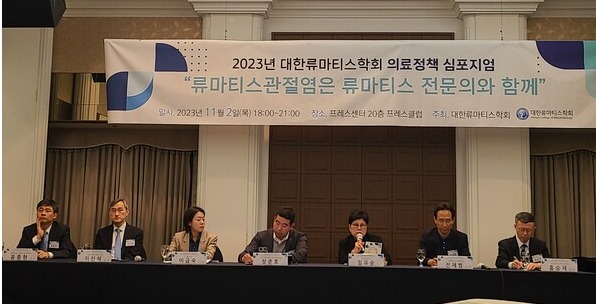"The first hospital I visited was an orthopedic clinic. However, I couldn't receive proper treatment there for five years, so I missed the golden time for early diagnosis, which also caused me a lot of financial pain. In addition, rheumatoid arthritis patients often arbitrarily reduce their medication due to steroid side effects. Even if they take stomach medication, their stomachs are often ruined by the prolonged use of rheumatoid arthritis drugs. So, they stay away from hospitals when they get better and return when their symptoms worsen."
Kim Yoon-sook, chairperson of the Korean Penguin Society, a patient group of rheumatoid arthritis, said so at a medical policy symposium held by the Korean College of Rheumatology (KCR).

The rheumatology society held a policy symposium, "Treat Rheumatoid Arthritis with Rheumatologists," at the Korea Press Center on Thursday, stressing the importance of visiting a rheumatologist to receive proper treatment for rheumatoid arthritis.
"The number of rheumatoid arthritis patients in Korea is increasing. However, according to a cohort survey by the National Health Insurance Service, the rate of referrals to rheumatologists and the prescription rate of anti-rheumatic drugs is also low," said Hong Seung-jae, KCR’s director of insurance. "We must find ways to connect rheumatoid arthritis patients to specialists’ care early."
According to Hong, rheumatoid arthritis is a major autoimmune disease that, if left untreated, can lead to irreversible destruction of joint tissue and joint deformity within two years of onset. In addition to arthritis, it invades various organs throughout the body, causing chronic inflammation, scleritis, dermatomyositis, and rheumatoid nodules. It is more common in women and is difficult to cure. Diagnosis is based on the rheumatology diagnostic criteria, which includes an X-ray examination of the hands and feet at the beginning of the disease, blood tests to determine the presence of rheumatoid factor and anti-CCP antibodies, history taking and physical examination to determine the presence of joint tenderness and swelling, and a final diagnosis of rheumatoid arthritis if the score is six or more out of 10.
"However, this process of differentiating rheumatoid arthritis from osteoarthritis in patients with joint pain cannot be accurately diagnosed unless doctors are not experienced," Hong said. "Therefore, early diagnosis and treatment of rheumatoid arthritis by a specialist who has studied and trained in rheumatology can improve the prognosis of joint damage and prevent many complications."
Rheumatoid arthritis should be treated by selecting and adjusting appropriate therapeutic agents by evaluating the achievement of goals at regular intervals, Hong noted. There are many effective drugs, including anti-TNF agents and biologics, but there are also many side effects. So, the safe use of these drugs requires regular monitoring of side effects, including susceptibility to infection, he added.
"Rheumatoid arthritis is an immune disease. So, it is very important not to miss the timing of early treatment," said Yoon Jong-hyun, KCR’s director for medical policy. "There are many good medicines that allow people to live without joint symptoms and inconvenience in daily life. Still, it’s unfortunate that many people live with disabilities because they missed the timing of treatment."
Yoon emphasized that expert education and counseling should be provided to improve safe prescribing and adherence to anti-rheumatic drugs. That requires policy support from the government by, for instance, establishing a training center.
"The development of biologics has been a turning point in the treatment of rheumatoid arthritis," KCR Chairperson Lee Shin-seok said. "In the U.S., biologics are used by 30 to 40 percent of all rheumatoid arthritis patients, and in Japan, 60 to 70 percent, depending on the hospital."
In Korea, however, only 8 percent of patients use biologics because insurance standards are too strict. Even if there is a good drug, patients cannot use it, Lee said.
"I think it is time for us to relax the standards like the U.S. and Europe," he said.
There is a limitation with biologics -- you cannot return to the previous treatment if the effect is not as satisfactory as you thought, Lee noted.
"If you are refractory to a JAK inhibitor, you cannot switch to a JAK inhibitor, but there are JAK inhibitors that have a slightly different mechanism and can be empirically effective. I think it is necessary to adjust the reimbursement criteria so that they can be switched."

